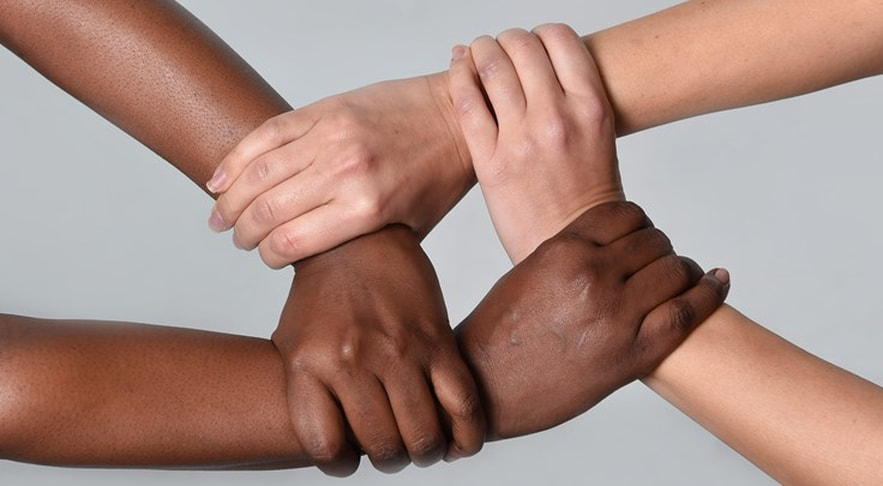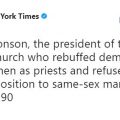“For unto whomsoever much is given, of him much shall be required.” (Luke 12:48).
You know in testimony meeting when a person says they didn’t want to stand up and speak but felt that they needed to? That’s me right now. I don’t want to court controversy. I’m not a “kick the hornet’s nest” type of person. I don’t want the inevitable flood of angry comments on social media because I’m even mentioning the concept of white privilege. I’d rather write about how Jesus helped my marriage or share funny memories from missionary service. It’d be easier. But I can’t ignore what’s staring me in the face.
I feel compelled to say something about the concept of white privilege in the wake of the Charlottesville neo-Nazi march, the violence that followed, and especially the trends that pop up everywhere as these are discussed on social media by Latter-day Saints and others. These trends have been showing up for years and reflect attitudes held by real people in the real world.
America is a family, or at least it ought to be. Few would argue that we’re not dysfunctional. I’m a family therapist, and in my professional opinion we need an intervention. We need to treat offenses, manage conflict, navigate miscommunication, and explore the effects of biases in our relationships. This is not about attributing blame, but rather recognizing what is really going on so that we can change it.
I don’t ask you to agree with me. I only ask you to leave your preconceptions and politics aside long enough to honestly and humbly consider my words. It’s that same honesty and, in my case being humbled, that’s brought me here. My only purpose is to help those who seek Christian discipleship to be better able to “mourn with those that mourn and comfort those who stand in need of comfort” (Mosiah 18:9) and to be “in the service of [our] fellow beings” so that we can “be in the service of [our] God.” (Mosiah 2:17)
3 COMMON ARGUMENTS REGARDING WHITE PRIVILEGE
Argument 1: White privilege is a myth which people of color use to blame whites for their problems
Argument 2: Racism is bad, but it goes both ways
Argument 3: We need to stand united as one and stop dividing people into groups
I understand these arguments, often put forth by decent people who I love and respect. In the past I’ve held to these views myself. But my profession trains me to listen to others with the intent to understand, not to refute. My faith teaches me to be humble and willing to change. I’ve listened to my friends of color, not to tell them they were wrong or to push my perspective, but just to understand them.
Look, I don’t like it when someone who’s not of my faith tries to tell me what I believe and what my experience is. I’d rather they listen to me. I paid the same courtesy to my friends of color. Now I’m convinced that I was wrong about white privilege.
Some of you are tuning me out right about now. Please don’t. Please read to understand and to consider. Keep an open mind as I explore why I believe these three arguments are flawed. My message is not of blame, nor of entitlement. It’s a message of unity and hope. But we can only get there if we change our thinking, because what we’re trying isn’t working.
CONTESTING THE ARGUMENTS
Argument 1: White privilege is a myth that people of color use to blame whites for their problems
Acknowledging white privilege is not about blaming whites for all problems. It is not saying that whites “have it easy,” don’t have to work for things, or that we’re all a bunch of cross-burning racists.
What it is is recognizing the reality of majority privilege and the especially vicious form it has taken in our country. Majority privilege is prevalent almost everywhere throughout history. For example, majority Hindus in India have not traditionally fought for the rights of minority Muslims. Those with the largest numbers naturally look after their own interests. Sometimes they actively persecute minorities while other times they simply favor those who are like them, occasionally without realizing they are doing it.
When Latter-day Saints Were Victims of Majority Privilege
This absolutely has happened, and continues to happen, in the “land of the free and the home of the brave.” We Latter-day Saints ourselves were the victims of majority privilege when, in 1840’s Missouri, not only were we harassed, robbed, raped, and murdered without protection from politicians or law enforcement, but the governor issued the infamous Extermination Order driving our people from the state, even giving the locals legal permission to kill us if we caused any trouble.
Why did this happen? Because majority privilege caused any of our attempts to stand up for ourselves to be considered a threat to the majority. Fear-mongering twisted public perception of our self-defense into sedition. Majority privilege meant that, even when the President of the United States knew we’d been wronged he sided with that majority, stating to Joseph Smith and company “Gentlemen, your cause is just but I can do nothing for you… if I take up for you I shall lose the vote of Missouri.” Local and federal leaders failed to uphold the Constitution and protect us.
We reflect on our persecutions from 150+ years ago, along with public opposition to our beliefs and a Broadway play roasting our culture, and often see ourselves as the recipients of prejudice. I won’t argue the point. But our black brothers and sisters have had it worse. Far worse. And they continue to have it worse, in part because we often think that they don’t.
America’s Failure to Uphold Its Inspired Documents
Our Constitution and our Declaration of Independence are inspired. The Lord himself declared that “the laws and constitution of the people… I have suffered to be established, and should be maintained for the rights and protection of all flesh, according to just and holy principles” (Doctrine and Covenants 101:77). America was divinely appointed to be a land of freedom from oppression and a place of opportunity for all. Yet the men who wrote it, inspired and in many ways noble men, were many of them slaveowners who considered African-Americans to be inferior.
They created an inspired document, but as a nation we weren’t ready to live up to it. God declared “it is not right that any man should be in bondage one to another. And for this very purpose I have established the Constitution of this land, by the hands of wise men whom I raised up for this very purpose, and redeemed the land by the shedding of blood” (Doctrine and Covenants 101:79-80). Yet even with the divinely-revealed Constitution, slavery and racist beliefs continued at the highest level and across the nation, despite our assertion that “all men were created equal” and that all were entitled to “life, liberty, and the pursuit of happiness.”
After the Civil War, Jim Crowe laws enforced segregation and denied blacks equal rights simply because of majority privilege, which was in this case white privilege, with its accompanying beliefs of white superiority and black inferiority. Normally-decent people were convinced that blacks were savages and animals who would rape their women and murder their children. Blacks were hanged, their homes destroyed, their family members raped, the belongings taken, and their right to be treated “like anybody else” were infringed upon. Why didn’t efforts against them succeed? Because of majority privilege, white privilege which lawmakers and authorities carried with them daily.
Majority Privilege in Charlottesville
Jim Crowe was repealed, many hearts have changed, and things are better, but the battle is far from won. Neo-nazis on college campuses and Americans openly venerating Hitler are proof enough of that. Why do these neo-Nazis, the KKK, and the alt-right feel the need to stand up for “white rights?” Because of majority privilege. “When you’re accustomed to privilege equality feels like oppression.” The quote has been attributed to many, but the source is less important than the idea.
These white supremacists are feeling oppressed because their majority privilege is being challenged. Their widely-published rallying cry of “you will not replace us” speaks to their underlying fear of no longer being the majority, of being replaced by today’s minorities and having their liberties trampled on as they’ve trampled on so many others. They’re essentially afraid of “an eye for an eye.”
I have many white friends who decry the alt-right, the KKK, and the neo-Nazis. These types of things, direct racial affronts known as macroaggressions, are generally opposed and denounced by people in my circle. But less-visible forms of oppression exist.
Majority Privilege in Government
Throughout American history white voters have generally voted for white politicians. Only in recent years have people of color gained any sort of traction. One black president does not change that. If there’s one thing politicians can be counted on to do, it’s to represent the people who put them into office. White politicians have gone to bat, largely speaking, for white voters and their interests.
In the best cases they may not intend to favor one group over another. They may not all believe one group as superior to another. But people fight for what they know, and that will be reflected in the laws they create. What’s more, standing up for the little guy and protecting the rights of all people has often been tantamount to political suicide, even though it is what’s required to uphold the Constitution. Some have braved ahead for what’s right. Many haven’t.
Microaggressions in the Church
In our daily lives, white (or majority) privilege takes the form not just of unjust laws (or even just laws which go unenforced) but in the form of microaggressions performed by good people who often don’t even realize that they’re doing them. Joking with a friend about his or her race might seem good-natured, but it can be hurtful. Imitating the speech or style of another ethnic group for laughs is a veiled form of implied superiority. Tensing up when a person of color shows up, and keeping a close eye on them, is a response to cultural conditioning, even if one consciously believes that “everyone is a child of God.”
Laughing at or making racially-driven humor, then claiming “it’s just a joke” is a form of microaggression. So is believing that someone might be more likely to be uneducated, unemployable, or a criminal. I’ve met fellow Latter-day Saints who claimed to be tolerant and loving towards people of all races but discouraged family members from dating or marrying someone who wasn’t white.
I’ve met fellow Mormons who agree that “all are alike unto God” (2 Nephi 26:33), yet see nothing wrong with using terms like “n*gger,” “wetback,” and “chink” to describe people of color (but “only the bad ones”). Many are well-read on past teachings by Church leaders stating that modern dark skin is the result of ancient curses or being less valiant in the premortal existence.
These same Latter-day Saints seem utterly clueless about Elder McConkie’s recanting his previously-espoused ideas about race. They seem not to know that President Hinckley affirmed racial equality in General Conference and strongly denounced racism and racist comments, stating that “no man who makes disparaging remarks concerning those of another race can consider himself a true disciple of Christ.” They apparently haven’t read the Church’s public condemnation of past racism “both inside and outside of the church.”
They seem to have overlooked Elder Uchtdorf’s General Conference talk in which he proclaimed “to be perfectly frank, there have been times when members or leaders in the Church have simply made mistakes. There may have been things said or done that were not in harmony with our values, principles, or doctrine.” Apparently these members also didn’t see the Church’s official essay exploring its racially-motivated priesthood ban, which lasted until 1978. Some, like Wife With a Purpose’s Ayla Stewart, continue to see The Book of Mormon as a record of racial superiority instead of one of racial equality.
How We Can Fix It
Doctrinally our faith has opened its doors to all people. Culturally, we’re hurting our black members and they are letting us know about it. Why do our members not stand up more to these microaggressions? Largely because American Mormons, just like Americans as a whole, are majority white. We don’t see things that don’t apply to us unless they’re unmissable and dramatic, like what happened in Charlottesville.
We have to start looking for how our majority privilege (i.e. white privilege) is coming into play. Otherwise we won’t see it. We have to stand alongside our brothers and sisters of color against the systematic, underlying ways in which they are oppressed and judged every day. We have to change our own thoughts and behaviors. We need to be who the Savior spoke of when he said “blessed are your eyes, for they see; and your ears, for they hear” (Matthew 13:16).
Argument 2: Racism is bad, but it goes both ways.
Racism is the belief that one race is superior than another. Are there people who see whites as inferior? Possibly, though I don’t know them. Whites are often the recipients of prejudice, not racism. There are people of color who hate whites and who don’t trust them. There are people of color who’ve had enough and are in an “eye-for-an-eye” space. There are people of color who demand equal rights and see whites as an obstacle to getting it. There are even people of color who are violent towards whites.
Mostly, however, people of color just want to stop hurting. That’s what I see everywhere as I read and as I interact with them. They want to stop feeling targeted. They want to stop seeing people who look like them dead on the news. They want us whites to not tell them to “get over it,” “stop playing the race card,” or that “racism died in the 60’s.” They want us to stop telling them what their experience is, stop telling them what they should do, and start listening.
Of course, it’s easier to believe that blacks are lazy, blame-shifting, law-breaking self-made victims [actual arguments of friends of mine who claim “not to be racist”] than to listen to them and consider their experiences and perspective. Just like it’s easier to believe Christians are bigots, Mormons are misogynist polygamists, Mexicans are criminals, Jews are crooks, atheists have no morals, gays are child-molesters, or any other number of prejudices that keep us all from loving one another (John 13:35), recognizing that “all are alike unto God” (2 Nephi 26:33), and that we must see the good in those who are different from us (see Mosiah 9:1)
So yes, prejudice exists everywhere. Hate exists everywhere. Racism, by Webster’s definition, occurs between different groups, not just whites to blacks. But in our country white racism has been combined with majority privilege on a systemic national level. Blacks haven’t had, and still don’t have, the power to oppress whites they way we’ve done to them. That’s why our racism is so toxic.
Our black brothers and sisters don’t have the numbers to dismantle majority privilege if we oppose them or, more frequently, are blind and apathetic to their plight. They cannot change hearts on their own. As we stand with them to dismantle white privilege, as we offer them equal opportunity and the hand of fellowship, prejudice and hurt on both sides with melt away.
Argument 3: We need to stand united as one and stop dividing people into groups
This is the most popular argument I see among decent, well-meaning white people (and even some black people). The idea is that we need to stop seeing how we’re different and celebrate how we’re the same. They cite 4 Nephi 1:17: “neither were there Lamanites, nor any manner of -ites; but they were in one, the children of Christ, and heirs to the kingdom of God.” They also quote the Lord: “Be one, and if ye are not one ye are not mine” (Doctrine and Covenants 38:27).
It is absolutely true that we need to stand united as one against injustice and oppression, celebrating our shared humanity. However, in my opinion we also need to stand with specific groups when their freedoms are threatened in order to stand for freedom as a whole.
Imagine if, during the Missouri persecutions, Alexander Doniphan had been more vague and general and said “Let’s all just get along and support freedom.” Joseph Smith would have been illegally tried and executed right there. Instead, Doniphan stood with us specifically. His position was essentially “Mormons are being mistreated. I don’t share their faith, but what is happening to them is wrong. Their freedoms are being threatened and I will fight for them.”
While we must stand for the broad principles freedom, love, and humanity, we have a Christian duty to defend anyone for whom those principles are threatened. For example, our church stood up for the LGBT community specifically when prejudice was keeping them out of housing and employment. We didn’t stand up for general rights to housing and employment but stood specifically for those being oppressed.
When a family member is being bullied, you don’t stand against the concept of bullying and call it good. You stand with that specific family member and defend them as one, even if it requires you to oppose another family member until that person, too, can be loving and accepting.
White Latter-day Saints, our black family (both in and out of our faith) needs us to stand with them. They need us to be aware of majority privilege (which in this country is white privilege), they need us to be aware of microaggressions, and they need us to challenge these daily- first in ourselves, then in those around us. They need us to love and care for them like the Good Samaritan, to be true neighbors instead of like those in the parable who failed to notice, failed to care, and kept walking.
Most of all, they need our voices to join theirs. Most of the white people I know are kind. We are decent. We believe that racism is wrong. We don’t actively persecute our neighbors of color. We are also, largely, blind, indifferent, apathetic, and silent. Said Martin Luther King, Jr: “In the end we will remember not the words of our enemies, but the silence of our friends.”
My name is Jonathan Decker. I am a white Latter-day Saint. I denounce any who would twist my faith to assert white superiority. I share my witness that all races are equal children of God. To people of color and any who are oppressed: I will use my privilege and position to fight your battles with you. I am your friend. I am your ally. I am your brother.
Latest posts by Jonathan Decker, Moroni Channel (see all)
- 9-year-old primary killed while riding bike - June 26, 2025
- 8 young women died during church activity - June 26, 2025
- LDS Church yet to issue official statement on reported Missionary kidnapping in Congo - June 21, 2025
- Utah Native Finds Success on Broadway and HBO’s Gilded Age - June 19, 2025





